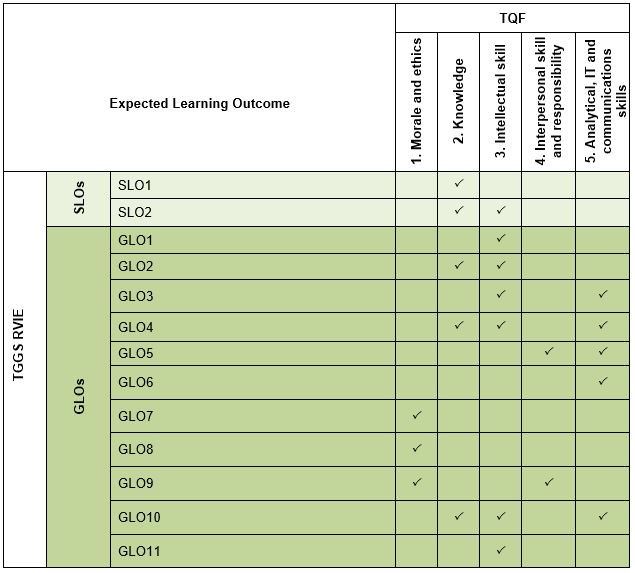The Program Expected Learning Outcomes (ELOs)
The RVIE master program was developed by taking the full advantage of the strength, experience of TGGS which is operated within KMUTNB, plus the tight relationship to GTRP. Therefore, the formulation of ELOs for the RVIE master program was clearly aligned with the vision-mission-identity of the faculty (TGGS), the university (KMUTNB) and even to the 20 years (2018–2037) strategy for the development of the Thai transportation system announced by the Ministry of Transport Thailand.
Subject Specific Learning Outcomes:
SLO1) Proper general knowledge (in rail vehicles and infrastructure engineering)
SLO2) Ability to apply knowledge (in rail vehicles and infrastructure engineering)
Generic Learning Outcomes:
GLO1) Ability to analyze problems
GLO2) Ability to design and develop problem solving methods
GLO3) Ability to investigate and query for facts
GLO4) Skills of using modern tools
GLO5) Ability to work independently and as a team member
GLO6) Ability to convey and present information
GLO7) Awareness of engineering responsibility
GLO8) Have professional ethics
GLO9) Awareness and ability to work while considering the environment, the sustainability and the sufficiency economy
GLO10) Awareness and ability to manage risks and investments
GLO11) Awareness and ability to learn for life (lifelong learning)
RVIE ELOs are complied with Thailand Quality Framework for Higher Education (TQF). The alignment between RVIE’s ELOs and TQF’s ELOs are summarized and shown by the matrix below.

With these ELOs, RVIE graduates can work as a railway vehicles and infrastructure engineer in industry sector, operator sector, government organizations, and even in related fields such as regulators, policy makers, technologist, consultant, entrepreneur, researcher, or lecturer in the private and government (university or research institute) sectors.
